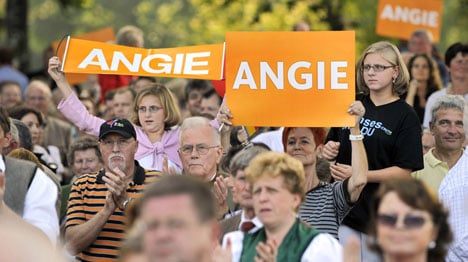Being a foreign correspondent is a bit like being an airline pilot. There are long periods of boredom, interrupted briefly by a stewardess bringing coffee, followed by short surges of adrenaline dealing with a crisis or political turbulence.
So this Sunday I’m preparing for Germany’s election night to be the equivalent of a crash-landing: from 6 pm until about 8:30 pm I’ll be trying to absorb masses of new information, interpreting it, and making it sensible for British readers. With the clock ticking in the background, I’ll have to take a rough guess as to the future of the government and the future of the country as the paper prepares to go to press.
Average Germans, of course, will not be sharing my sense of terror – they’ll be treated to a soap opera about – ahem – average Germans.
At 6:50 pm sharp, 50 minutes after the first exit polls are released, public broadcaster ARD will interrupt the shrewd number-crunching of its analysts to roll the credits of “Lindenstrasse” – a rather dull soap based loosely on Britain’s “Coronation Street” that’s flickered on German TVs for the past quarter of a century.
The tortured possibilities of coalition arithmetic and the puffing of flush-faced Teutonic politicians will abruptly give way to the adventures of Harry the loser, Andi the taxi driver, the döner kebab snack shop owner whose best friend is a neo-Nazi, and Tanja the Lesbian hairdresser.
Now there are those who see similarities between the goings-on of Bavarian politics and the Munich-based “Lindenstrasse” gang. But to us foreigners it looks like a rather bizarre segue when the future of the national hangs in the balance. Plainly the ARD church elders decided long ago that German viewers cannot cope with too much excitement – why else show Volksmusik every Saturday evening, right? Yes, the Germans are interested in who runs their country but, well, not that interested.
It is fashionable, of course, to blame Chancellor Angela Merkel for the evaporation of interest in politics. It is her style, after all, to treat politics as just another form of decision-making. As in, shall we buy a new refrigerator, darling?
The facts are gathered in from the consumer reports experts at Stiftung Warentest and you assess the situation. The old machine sounds like a Panzer warming up for action, is uses too much electricity and it is difficult to defrost. But it works. A new fridge would cost €500, but would be quieter, hold more beer and wouldn’t stink so much. You talk about it during the advertising breaks in from Günther Jauch minting Germany’s next millionaire. You sleep on it. And then you make a calm decision.
That is how Merkel has taught us to think about politics. She has reduced it to the size of the living room. No wonder we are all so bored.
But this is not completely fair to the chancellor. The “Lindenstrasse” episode on election night was a tradition long before Ms Merkel left the laboratories of East Germany’s Institute for Physical Chemistry. The modern German miniaturises political processes; it is his or her response to the politicisation of everyday life under the Nazis and the communists. Big ideas are made small, and less threatening.
Take former Chancellor Gerhard Schröder’s Agenda 2010. An ambitious attempt to overhaul the country’s welfare state? That’s certainly how we saw it abroad. But for ordinary Germans it became largely a question of whether shops should shut at 2 pm or 6 pm on Saturdays. (Berlin significantly seems still stuck in this Amish phase – I can’t believe that the capital of Germany is considering closing shops at the main train station on Sundays.)
What was Schröder’s progressive coalition of Social Democrats and Greens to the ordinary German voter? For foreigners, it was an intriguing eight years in which Germany tried to free itself from the post-war corset. It seemed easier with itself, more sovereign. But for the average German it meant only one thing: a pricey and annoying deposits on beverage cans. The government became the unacceptable face of eco-bureaucratic rule.
Over the past year, the Merkel’s grand coalition of Christian and Social Democrats has thrown hundreds of billions of euros at fragile banks and companies. It has (usually without consulting taxpayers) propped up the economy but at the price of amassing huge debts. These have been taboo-shattering months. But what sticks in the mind of Joe Sixpack – known as Otto Normalverbraucher here? The “cash for clunkers” Abwrackprämie.
The reason is clear: Germany is a nation of bargain hunters. The strongest collective emotions are stinginess and envy and they have become the engine of German politics. Any policy that addresses or feeds these character traits will capture the attention of the voter; anything that hints of the visionary or utopian is a source of deep suspicion.
It is in other words not the politicians who are letting us down with their mediocrity, their inability to enchant or inspire. The political class has become boring because that’s the way we want it to be. The problem lies in the low expectations of the average voter. The Germans may pretend to love US President Barack Obama, but they really wouldn’t want him over here. They want what’s small and manageable not grand and bold.
They want “Lindenstrasse” at 6:50 pm on election night and, by God, that’s what they’re going to get.




 Please whitelist us to continue reading.
Please whitelist us to continue reading.
Member comments